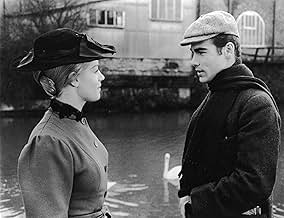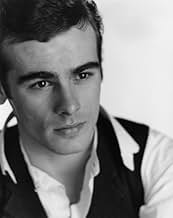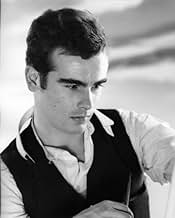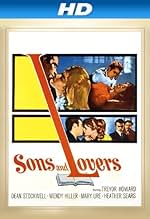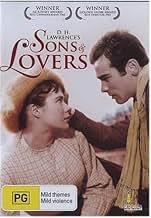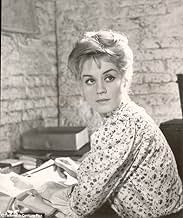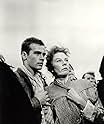Füge eine Handlung in deiner Sprache hinzuA young man with artistic talent lives in a close-knit coal-mining town and finds himself inhibited by his emotionally manipulative mother.A young man with artistic talent lives in a close-knit coal-mining town and finds himself inhibited by his emotionally manipulative mother.A young man with artistic talent lives in a close-knit coal-mining town and finds himself inhibited by his emotionally manipulative mother.
- 1 Oscar gewonnen
- 8 Gewinne & 16 Nominierungen insgesamt
Handlung
WUSSTEST DU SCHON:
- WissenswertesDean Stockwell was cast at producer Jerry Wald's insistence to help the film's chances of distribution in the United States.
- Zitate
Miriam: You know, my mother disapproves more and more of the books you bring. She blames you for putting ideas into my head.
Paul Morel: Does she think heaven frowns on ideas? Your mother breathes religion through her nostrils!
Miriam: Do you think that's wrong?
Paul Morel: It's not religious just to be religious! I think a crow is religious as it sails across the sky. It's showing the glory of God but it doesn't know it. God doesn't know things, he is things.
- VerbindungenFeatured in Cameraman: The Life and Work of Jack Cardiff (2010)
There is an excellent script by Gavin Lambert aided by T.E.B. Clarke, which does a fine job of putting into 103 minutes a long, complex novel. Each scene in this film has a purpose to reveal character and make thematic points. There are no wasted scenes or aimless dialogue, yet the dialogue and action all seem natural. The characters are real and immediately involved me.
There is a complexity to the characters. Paul's mother wants the best for him, yet at the same time she wants him for herself. Paul both wants to be free of his mother and is inextricably bound to her, so much that he refuses an all-paid education at a London art school to stay home with her, saying he doesn't want to see her alone with her abusive husband.
Gertrude and Walter Morel's marriage is a complex one that befuddles Paul as he tries to understand the complex connection between the sensitive mother and the outwardly angry, rough father, who is, underneath, a very sensitive man, too. Walter fully understands the close relationship between his wife and Paul and knows he's locked out of that. He's both jealous of and angry at their closeness.
Many excellent scenes here could stand alone. One such is the scene leading up to Paul and Clara having sex for the first time. There is good use of close-ups here in which Clara and Paul must convey much with their eyes.
A certain restraint to the performances here give the characters an intensity they might not have were their performances more flamboyant, if they'd been given "big" scenes to play with shouting, tears, and so on.
The cast in this film is perfect. I don't know of another film about which I could make that statement. I don't see a single poor performance. I can't imagine any other actors doing these roles. Each one fully inhabits the character that he/she is playing. It was a pleasure to see Heather Sears and Mary Ure again; both died far too young. And Dean Stockwell is at his youthful, handsome best. Wendy Hiller and Trevor Howard are both excellent. The excellence extends to the supporting players.
The film is beautifully photographed in black and white. I'm sure this derives partly from director Jack Cardiff's background as a photographer, though Freddie Francis was the cinematographer here and won an Oscar for his work. Gavin Lambert and cast members Hiller and Howard didn't think much of Cardiff as director, whom 20th Century Fox forced upon producer Jerry Wald. Hiller and Howard both said they directed themselves throughout the film.
The film was made in Cinemascope and should be seen in that form, for it doesn't scan well. (Another IMDb commentator has written well about this; see his comments.) Cardiff made good use of close-ups, but every part of this film is excellently framed, the positions of the characters in the frame, their relation to various items in the landscape. And the landscape adds a lot to the mood of the film.
The film has an excellent score (It should be seen in a theatre with a fine sound system), but it is not overscored, and the theme song doesn't become intrusive. This theme never became a hit like the theme from "A Summer Place" did, though the theme did turn up on a number of instrumental albums back in the 60s. People often didn't know from what film it came.
I'm glad to know this film and appreciate its virtues.
The film will probably send viewers to the novel, where they can find complete details about the Morel family yet also realize how well the film conveys the novel.
A PBS version of this novel, starring Eileen Atkins as Gertrude Morel, Tom Bell as Walter Morel, and Karl Johnson as Paul, was shown in 1981. It has never been shown subsequently on PBS or elsewhere to my knowledge nor was it ever issued on video. Was it that bad?
Top-Auswahl
Details
Box Office
- Budget
- 500.000 $ (geschätzt)
- Laufzeit1 Stunde 43 Minuten
- Farbe
- Seitenverhältnis
- 2.35 : 1
Zu dieser Seite beitragen



